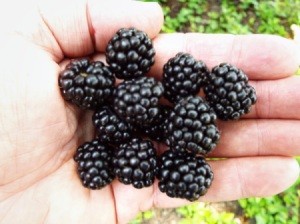
 I'm doing my best to get fellow members to look into growing berries and dwarf fruit trees in small, sunny spaces about their homes. Eating fruits and berries you have grown has very satisfying rewards. The Europeans are, and have been, way ahead of us in utilizing any free space about the home to grow fruits and vegetables.
I'm doing my best to get fellow members to look into growing berries and dwarf fruit trees in small, sunny spaces about their homes. Eating fruits and berries you have grown has very satisfying rewards. The Europeans are, and have been, way ahead of us in utilizing any free space about the home to grow fruits and vegetables.
Let's talk blackberries. I bought four $10.00 plants that were marked down to $3.00 each. There are several different types of blackberries. I won't go into the differences, here. I will say that the type I bought bears fruit on the second year's growth.
If you buy such a plant with all new growth, you will not get any berries the first year. This new growth will stay on the plant til next year. Then it will bear berries. While this, now, second year's growth is bearing berries, new growth will arise from the base of the plant. After the berry bearing canes stop producing, they begin to die down and eventually die all together. The new growth will survive the winter and become next year's canes to bear berries.
What should one do with the bearing canes when they begin to die back? You can cut them back to the ground and discard them. But don't be so hasty to do that. Cuttings can be taken from these canes as soon as the berries are harvested. They are easily rooted. You could easily get 10 new plants from these 'dying' canes. (You also can easily root tender new growth, but that's another post).
After your initial purchase, all your plants can be free. A little fertilizer and bird netting will be about your only expenses. Water? Yes. Count that as an expense if you like. Blackberries like lots of water.
With the two varieties I bought being 'erect' rather than 'spreading', the full grown berry bearing plants have a diameter that hardly exceeds that of the 5 gallon buckets they are planted in. These winter hardy plants stay outside over winter and need no protection.
Decision making? Well, in this case, do I make wine with these big bad boys, or do I make a cobbler? Actually, I won't do either. Next year, my plants will be larger, more established and will bear more fruit. For now, I will periodically traipse to the back yard, pick a handful of berries and simply indulge.
I do plan to puree a few and have them over vanilla ice cream. Yes!
Are you convinced, yet?
Add your voice! Click below to comment. ThriftyFun is powered by your wisdom!
Do they like a lot of water? Someone told me to water mine once ever five days and be careful because they hate water. I better do some more research! I have only picked 8 berries this year and they've been okay. Bit tart. But I agree on the ice cream thang!
I've lived in Western Washington and Oregon most of my life and we had blackberries everywhere. No one grew them on purpose, they were just a weed. So, I would guess they don't mind a lot of water.
I bought a Triple Crown thornless blackberry this year. I water it every day or two, unless we have rain. No berries or anything yet, but I have only had it for about a month now.
I really should have done more research before making the 'water' statement. i think I read that they like a lot of water and I did give mine a lot. They have thrived. Maybe it's good to withhold water during the last stages of ripening so as to make the berry sweeter (as you would do with a watermelon)? I'll ask my ag agent.
By mine being in buckets, they don't drain as well. So, I'm thinking they do like lots of water. As I say, 'they have thrived'.
I just wouldn't keep them waterlogged.
I did a bit of research concerning water requirements for blackberries. Here are excerpts from an article published by the NCSU.
1. In general, their root systems do not tolerate wet soils. (My note: This is not to indicate the plants don't need adequate water, rather that the soil should be a well drained type).
2. Lack of water before or during harvest can seriously reduce productivity. Water is the most critical factor for optimal fruit growth and primocane development. A shortage of water at this time will limit fruit size and also the number and diameter of primocanes. This limitation will negatively impact both the current seasons and the following years crops. Nearly all of the moisture used by blackberries comes from the top 6 inches of the soil, which is the primary rooting zone. Blackberry plants generally need at least 1 inch of water during each 7- to 10-day interval of the growing season.
Here are some facts I gathered on the Triple Crown variety. The last two have convinced me to try it, along with the fact that it greatly extends the blackberry harvest season.
Triple Crown
Thornless semi-erect
Medium -large, 6-8 g
Ripe late July - 10 August
Yield high
Flavor probably best among USDA thornless
I had attempted blackberries before and when I planted them in a new bed, they grew great only draw back is we have an abundance of wild lantana and that over took it and of course died. I have not tried them again, although I love blackberries, not sure how they will do with the lantana in South Texas
I have several reasons for growing blackberries in 5 gallon buckets. I don't want to dig up an area for them. By them being in buckets, I can group them together in such a way it is easy to cover them with netting. And it is easier to keep out invaders like the lantana you speak of.
Blackberries are a tough and very hardy plant. If they can be overtaken by lantana, this lantana must surely be a difficult plant to deal with.
I bought one thorn less blackberry that thrives well in Texas several years ago and have gotten several cuttings. As of this writing I have quite a few blackberries on the plants now and they are in 5 gallon buckets. Mine require lots of water and when the Temp gets above 100 I moved them into partial shade. They seem to do very well this way and have no problems wintering them.
My thornless blackberry has lots of flowers this spring so I'm hoping for a decent crop this year.
I only have wild blackberries...no store bought varieties. The wild ones do GREAT in wetter summers, rather than dry summers. They LOVE water, but do not like to stand in a wet location...is can cause root rot and death of the plants. During a wet summer, my wild blackberries get so loaded down with huge, sweet berries, that the tip ends of the 5 to 6 foot long canes will be 1 1/2 to 2 feet of the ends laying on the ground before picking, and after harvesting the tips will be 3 feet in the air!!! Now that's a lot of sweet, juicy blackberries. The one drawback to these wild berry bushes over domestic ones is that the wild ones ALWAYS have tons of thorns. A small price to pay for the rewards I get!!
Add your voice! Click below to comment. ThriftyFun is powered by your wisdom!